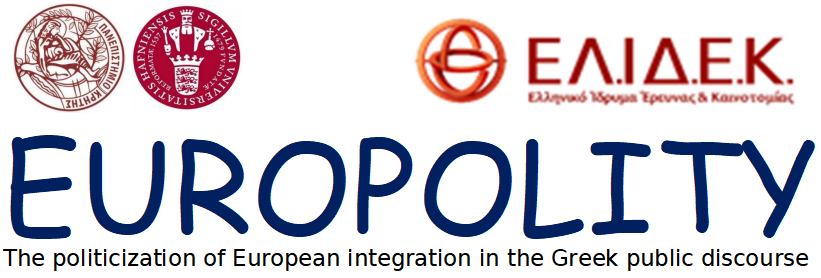 The project analyzes the public discourse regarding the European integration process in Greece from 1975, when Greece officially applied to become a full member state of the European Economic Community, until today. Using a political claims approach that combines political discourse with an analysis of attribution of responsibility and by using media data as the main source, the project traces the politicization of European integration in Greece. Politicization in general terms means “the demand for or the act of transporting an issue into the field of politics – making previously apolitical matters political” (De Wilde & Zürn 2012: 139). The politicization of European integration that until some years ago was seen as absent is now widely accepted (Statham & Trenz 2015: 287). Thus, EU politicization is mainly used to describe more recent phenomena that indicate a change in patterns of support and opposition with European integration. Aiming to distinguish and compare the several styles of political debates on European integration in a national case study, we analyze these patterns of support and opposition in a long-term perspective.
The project analyzes the public discourse regarding the European integration process in Greece from 1975, when Greece officially applied to become a full member state of the European Economic Community, until today. Using a political claims approach that combines political discourse with an analysis of attribution of responsibility and by using media data as the main source, the project traces the politicization of European integration in Greece. Politicization in general terms means “the demand for or the act of transporting an issue into the field of politics – making previously apolitical matters political” (De Wilde & Zürn 2012: 139). The politicization of European integration that until some years ago was seen as absent is now widely accepted (Statham & Trenz 2015: 287). Thus, EU politicization is mainly used to describe more recent phenomena that indicate a change in patterns of support and opposition with European integration. Aiming to distinguish and compare the several styles of political debates on European integration in a national case study, we analyze these patterns of support and opposition in a long-term perspective.
The analysis focuses and evolve around key events and critical thresholds (Treaties and agreements, European elections etc.) in the evolution of Greece’s accession to the European Economic Community (EEC) and later the country’s embedding in the European Union (EU). The project describes and explains systematically in which way actors interpret the European integration process. It applies a long-term perspective that allows to track changes over time and make cross country comparisons with other national case studies. The claims making approach brings to surface the actors (politicians, opinion-makers, civil society actors etc.) who appear in media reports and thoroughly analyzes their views. This allows for a causal explanation based on the strategic action in specified structural positions. It also highlights the degree of Europeanization/transnationalization in Greek public debates since it shows to whom and at which spatial level the relevant claims are addressed each time.
The project is held in the Department of Sociology and the Centre for Research and Studies (KEME) at the University of Crete with the cooperation of the Centre for Modern European Studies (CEMES) at the University of Copenhagen. It started in August 2018 and is running until February 2022.
Project Information
Project Type: Research Project
Call:
ELIDEK 2017: 1st call for post-doctoral researchers
Start date: August 2018
Duration: 36 months
Coordinator:
Dr. Kostas Kanellopoulos, University of Crete
Grant Agreement No:
Project Budget: € 150,000.00
Copyright © 2018 by Europolity
